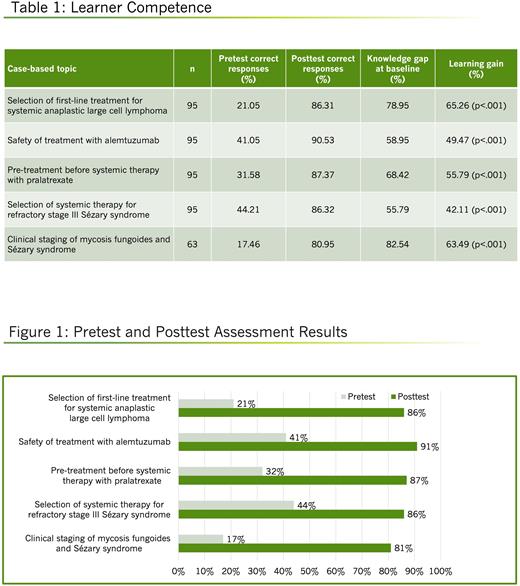Abstract
Background: Peripheral T-cell lymphoma (PTCL) and cutaneous T-cell lymphoma (CTCL) are rare and have varied and often nonspecific clinical and pathologic presentations, making diagnosis and treatment challenging. This study was conducted to determine if an online, case-based continuing medical education (CME)/nursing continuing professional development (NCPD) activity could improve clinicians' knowledge of advances in T-cell lymphoma (TCL) and address gaps in clinicians' knowledge regarding diagnosis, therapeutic selection, and management strategies for patients with newly diagnosed and relapsed/refractory disease.
Methods: The CME/NCPD-approved live webinar series titled Diagnosis and Evidence-Based Management of T-Cell Lymphoma was presented by Aaron M. Goodman, MD, on June 13 and June 17, 2022, and was made accessible as a CME/NCPD-approved enduring webinar archive starting on June 30, 2022. Learners participated in a 1.25-hour activity that highlighted evidence-based criteria for differential diagnosis, efficacy and safety data to guide therapeutic selection for both newly diagnosed and relapsed/refractory disease, and strategies for optimizing treatment tolerability and improving outcomes. Learners completed a repeated-pairs pre- and post-activity assessment consisting of case-based questions that gauged their ability to apply emerging data to clinical decision making; these two assessments were used to calculate baseline knowledge gaps and subsequent learning gains. Significance was determined using a chi-squared test. In addition, learners reported self-perceived gains in confidence and competence using 5-point Likert scale questions.
Results: As of July 28, 2022, 135 learners participated in the live webinar, and 80 have participated in the ongoing online enduring activity. The learners comprised physicians (33%), registered nurses (47%), nurse practitioners (5%), pharmacists (1%), physician assistants (1%), and individuals with other professions (13%). Of these, 125 clinicians completed the activity for credit, including 60 who completed the live webinar and 65 who completed the online enduring activity. Baseline assessment data revealed gaps in knowledge regarding emerging efficacy data and management of treatment-related adverse events (Table 1). For learners who completed the assessments in the live webinar, the mean score for all topics combined rose 35% from the pre- to the post-activity assessments (41% vs 76%); for learners who completed the assessments in the enduring activity, the mean score for all topics combined rose by 64% (27% vs 91%). The activity resulted in significant gains in knowledge and competence related to these topics, with P < 0.001 for all learning gains (Table 1, Figure 1). Upon completion of the activity, 87% of learners self-reported that knowledge acquired from this activity would be utilized to improve the outcomes of their patients, and 87% of learners self-reported that based on the information learned during the activity, they felt more confident in treating patients with TCL.
Conclusions: These data demonstrate that online, case-based CME/NCPD-approved activities can result in statistically significant improvements in clinicians' knowledge of therapeutic advances and management of treatment-related adverse events for patients with TCL.
Acknowledgements: This activity was supported by an independent educational grant from Seagen. All slide content for the activity was chosen by Aaron M. Goodman, MD. Seagen did not have input into slide design and teaching materials.
Disclosures
Heller:GlaxoSmithKline: Current equity holder in publicly-traded company.
Author notes
Asterisk with author names denotes non-ASH members.


This feature is available to Subscribers Only
Sign In or Create an Account Close Modal